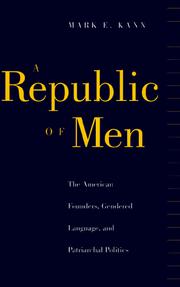| Listing 1 - 1 of 1 |
Sort by
|

ISBN: 0814763529 0585425116 0814747132 0814747140 9780585425115 9780814747131 9780814747148 9780814763520 Year: 1998 Publisher: New York London New York University Press
Abstract | Keywords | Export | Availability | Bookmark
 Loading...
Loading...Choose an application
- Reference Manager
- EndNote
- RefWorks (Direct export to RefWorks)
What role did manhood play in early American Politics? In A Republic of Men, Mark E. Kann argues that the American founders aspired to create a "republic of men" but feared that "disorderly men" threatened its birth, health, and longevity. Kann demonstrates how hegemonic norms of manhood–exemplified by "the Family Man," for instance--were deployed as a means of stigmatizing unworthy men, rewarding responsible men with citizenship, and empowering exceptional men with positions of leadership and authority, while excluding women from public life. Kann suggests that the founders committed themselves in theory to the democratic proposition that all men were created free and equal and could not be governed without their own consent, but that they in no way believed that "all men" could be trusted with equal liberty, equal citizenship, or equal authority. The founders developed a "grammar of manhood" to address some difficult questions about public order. Were America's disorderly men qualified for citizenship? Were they likely to recognize manly leaders, consent to their authority, and defer to their wisdom? A Republic of Men compellingly analyzes the ways in which the founders used a rhetoric of manhood to stabilize American politics.
Men -- United States -- History -- 18th century. --- Patriarchy -- United States -- History -- 18th century. --- Political culture -- United States -- History -- 18th century. --- Political science -- United States -- History -- 18th century. --- Sex role -- United States -- History -- 18th century. --- Social role -- United States -- History -- 18th century. --- Political culture --- Political science --- Men --- Patriarchy --- Sex role --- Social role --- Government - U.S. --- Law, Politics & Government --- Political Institutions & Public Administration - U.S., General --- History --- Role, Social --- Gender role --- Androcracy --- Patriarchal families --- Human males --- Social psychology --- Social status --- Sex (Psychology) --- Sex differences (Psychology) --- Gender expression --- Sexism --- Fathers --- Families --- Male domination (Social structure) --- Patrilineal kinship --- Human beings --- Males --- Effeminacy --- Masculinity --- United States --- 18th century --- Role (Sociology) --- Gender roles --- Gendered role --- Gendered roles --- Role, Gender --- Role, Gendered --- Role, Sex --- Roles, Gender --- Roles, Gendered --- Roles, Sex --- Sex roles
| Listing 1 - 1 of 1 |
Sort by
|

 Search
Search Feedback
Feedback About UniCat
About UniCat  Help
Help News
News